Synarel
Synarel ®
2mg/ml Nasal Spray Nafarelin acetate
10766204

PACKAGE LEAFLET: INFORMATION FOR THE USER
Important things that you SHOULD know about your medicine:
• SYNAREL is for the treatment of endometriosis or as part of a supervised fertility programme and is for use by women only.
• This medicine has been prescribed for you. Do not pass it on to others. It may harm them, even if their symptoms are the same as yours.
• You should take SYNAREL regularly as instructed by your doctor or nurse, in order for it to be effective.
• Most people do not have serious problems when taking SYNAREL but side effects can occur - see Section 4 for details. If any of the side effects gets serious, or if you notice any side effects not listed in this leaflet, please tell your doctor or pharmacist.
• Taking other medicines may sometimes cause problems. Check with your doctor or pharmacist before taking this or any other medicines.
Please read the rest of this leaflet. It includes other important information on the safe and effective use of this medicine that might be especially important to you.
If you have any further questions, ask your doctor or pharmacist. This leaflet was last updated in 01/2016
What is in this leaflet
1. What Synarel is and what it is used for
2. What you need to know before you take Synarel
3. How to take Synarel
4. Possible side effects
5. How to store Synarel
6. Contents of the pack and other information
1. What Synarel is and what it is used for
Synarel works by reducing the normal response of your body to a hormone called GnRH (gonadotrophin releasing hormone). As a result, your ovaries produce less of another hormone called oestrogen. You will notice the reduced amount of oestrogen usually by your periods either stopping or being reduced in amount after about one month of taking Synarel. Synarel has to get into your blood stream before it can work. This cannot happen if it is taken by mouth, because your stomach acid will break it down and it will be digested. Therefore, nasal inhalation is a simple way to get this medicine into your blood stream.
Synarel is used to treat endometriosis. It can also be prescribed with other medicines for women trying to become pregnant as part of a supervised fertility programme.
2. What you need to know before you take Synarel ' Do not use Synarel
• If you are allergic to Synarel, gonadotrophin releasing hormone or any of the other ingredients of this medicine (listed in section 6).
• If you are pregnant or may become pregnant whilst taking Synarel. If you are taking Synarel as part of a fertility programme, your pregnancy will be planned to take place after you stop taking this medicine.
• If you suffer from vaginal bleeding, for which your doctor could not find the cause.
• If you are currently breast-feeding.
• If you are under 18 years of age.
' Warnings and precautions
Talk to your doctor or pharmacist before using Synarel
• If you suffer from Polycystic Ovarian Disease as there is a potential risk for excessive follicular stimulation
• If you think you might be pregnant there is a risk to the development of the foetus and/or miscarriage.
• There have been reports of depression in patients taking Synarel which may be severe. If you are taking Synarel and develop depressed mood, inform your doctor.
Your doctor will advise whether you can still take Synarel. ' Other medicines and Synarel
Tell your doctor or pharmacist if you are using, have recently used, or might use any other medicines.
Nasal decongestants should not be used within the 30 minute period before taking a dose of Synarel as they can significantly reduce absorption of the medicine in the nose. If your nose is congested, Synarel will still be absorbed.
If you have been using an oral contraceptive to prevent pregnancy, your doctor will ask you to stop taking these and use a barrier method of contraception (diaphragm, condom) to stop you becoming pregnant.
' Synarel with food and drink Synarel can be taken with or without food.
' Pregnancy, breast-feeding and fertility
Do not take Synarel if you are pregnant or trying to
become pregnant.
Do not take Synarel if you are breast-feeding.
' Driving and using machines
Synarel is not known to affect the ability to drive or use machinery. ' Synarel contains benzalkonium chloride
Benzalkonium chloride (a type of preservative) is an irritant and may cause skin reactions, swelling and bronchospasm.
3. How to use Synarel
Always use this medicine exactly as your doctor or pharmacist has told you. Check with your doctor or pharmacist if you are not sure.
' How to use your medicine
For endometriosis: the usual dose is one spray twice each day for six months. Spray into one nostril in the morning, and the other nostril in the evening (a total of 2 sprays per day). You should use the spray for the first time between the second and fourth day of your period.
For endometriosis, the longest time for which you should be taking your medicine is 6 months.
For use in fertility programmes: if you are taking this medicine as part of a fertility programme, the dose is usually one spray to both nostrils in the morning, and one spray to both nostrils in the evening (4 sprays per day).
If you are taking this medicine as part of a fertility programme, your doctor will tell you how long to keep taking your medicine. This will usually be for no longer than 8 weeks.
Take your spray as your doctor has told you to. If you are still not sure, ask your doctor or pharmacist.
It is important to keep taking your spray.
If you have any questions, don't wait until your nasal spray is finished before seeing your doctor.
Priming the Spray Pump: Before you use a bottle of Synarel for the first time, you have to prime the spray pump. This only needs to be done once, before you take your first dose.
1. Remove the safety clip and the plastic dust cap to uncover the nasal piece. Hold the bottle with two fingers on the 'shoulders' and your thumb on the bottom of the bottle.
2. Prime the pump by pressing the bottle upwards several times firmly and quickly until the air is expelled and a fine spray appears. This usually requires about 5 - 7 presses. It is not necessary to prime the pump again during subsequent use.
Using the Spray Pump
1. Gently blow your nose to clear the nostrils.
2. Remove the safety clip and the plastic cap to uncover the nasal piece. Hold the bottle as shown previously.
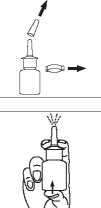
3. Clean the tip of pump. Hold the bottle in a horizontal position and rinse the spray tip with warm water, while wiping the tip with your finger or a clean soft cloth.
Do not clean the spray tip with a pointed object. This could cause an improper dose of the spray to be delivered. Do not remove the pump from the bottle, as this will release the priming pressure.
Wipe the tip dry with a clean soft cloth or tissue.
4. Bend head forward slightly. Close one nostril and put the spray tip into the other, aiming towards the back and outer side of your nose.
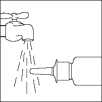
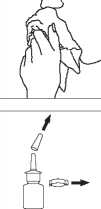
5. Press the bottle firmly up between thumb and fingers once only whilst gently breathing in through the nostril. If your doctor has told you to take 4 sprays every day, now spray into your other nostril.
6. Remove the sprayer from the nostril. Bend head backwards for a few seconds to let the spray spread over back of the nose.
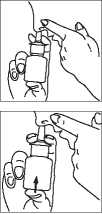
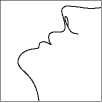
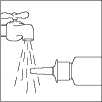
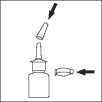
7. Clean the tip of pump. Hold the bottle in a horizontal position and rinse the spray tip with warm water, while wiping the tip with your finger or a clean soft cloth.
Do not clean the spray tip with a pointed object. This could cause an improper dose of the spray to be delivered. Do not remove the pump from the bottle, as this will release the priming pressure. Wipe the tip dry with a clean soft cloth or tissue.
Cleaning the spray tip before and after use is important to prevent clogging of the tip.
8. Replace the safety clip and the plastic dust cap on the nasal piece.
If you use more Synarel than you should
• If you have taken too many sprays at once, or in one day contact your doctor or go to your nearest hospital casualty department immediately.
If you forget to use Synarel
• If you forget to take your spray at the proper time, take it as soon as you remember and take the next spray at your normal time. Do not take a double dose to make up for a forgotten dose.
• If you miss one or more doses, vaginal bleeding (often called breakthrough bleeding) may occur. Also, release of an egg from the ovary (ovulation) may occur. If you have had sexual intercourse and not used contraception, you could become pregnant. It is then important that you stop taking Synarel and see your doctor to make sure that you are not pregnant. (This is why it is very important to use a barrier method of contraception when you are taking this medicine.).
• Take your spray as your doctor has told you to.
• If you are still not sure, ask your doctor or pharmacist.
• It is important to keep taking your spray.
• If you have any questions, don't wait until your nasal spray is finished before seeing your doctor.
4. Possible side effects
Like all medicines, Synarel can cause side effects although not everybody gets them.
Stop taking Synarel and tell your doctor straight away if you have an allergy to this medicine. If you are allergic to it, you may become short of breath, have chest pain, or a rash which may or may not be itchy.
Other side effects Synarel may cause are listed below by frequency:
Very common side effects: may affect more than 1 in 10 people
• weight increase
• swings of emotion
• sex drive decrease
• headache
• hot flushes
• nasal irritation and/or inflammation
• acne
• oily appearance on the skin and the formation of grease scales
• painful muscles
• breast size decrease
• vaginal dryness
• oedema
Common side effects: may affect up to 1 in 10 people
• allergic reaction which may include shortness of breath, chest pain and a rash which may or may not be itchy
• itching which may be accompanied by swelling
• skin rash including hives
• oestrogen deficiency
• weight decrease
• depression
• tingling sensation in parts of your body
• hypertension
• hypotension
• excessive hair growth
• artificial menopause
• abnormal bleeding from the vagina
• sex drive increase
• difficulty sleeping (insomnia)
• bone density decreases
Uncommon side effects: may affect up to 1 in 100 people
• hair loss
• joint pain
• breast size increase
• ovarian cyst formation
Not known side effects: the frequency cannot be estimated from the available data
• migraine
• blurred vision
• palpitations
• liver enzyme increases
• short term increase in symptoms of endometriosis Tell your doctor if you are due to have any medical tests as the results may be affected.
If you get any side effects, talk to your doctor or pharmacist. This includes any possible side effects not listed in this leaflet.
5. How to store Synarel
• You should always put the safety clip and the plastic dust cap back on when you are not using the medicine.
• Keep your spray out of the reach and sight of children.
• Do not use Synarel after the expiry date which is stated on the carton after EXP. The expiry date refers to the last day of that month.
• Do not store above 25°C and protect from freezing.
• Keep the bottle upright and store away from light.
• Do not throw away any medicines via household waste. Ask your pharmacist how to throw away medicines you no longer use. These measures will help protect the environment.
6. Contents of the pack and other information
What Synarel contains and its package:
The active substance is nafarelin acetate. The Synarel spray liquid contains nafarelin acetate equivalent to a concentration of 2 mg/ml nafarelin in a bottle fitted with a metered spray pump. Each actuation of the spray pump delivers 200 micrograms of nafarelin.
The other ingredients in the spray liquid are:
• Sorbitol, benzalkonium chloride, glacial acetic acid, water; and
• Sodium hydroxide or hydrochloric acid to adjust the acidity.
Synarel is available in white, high density polyethylene bottles with a 0.1ml metered spray pump, containing 6.5ml (30 sprays) or 10ml (60 sprays). Synarel is also available in PVC-coated glass bottles with an internal conical reservoir in the base and a valois pump, with either an aluminium crimp-on cap or a polypropylene snap-on cap, containing 4ml (30 sprays) or 8ml (60 sprays). These are designed to deliver 30 or 60 sprays respectively (as stated on the pack) and should be disposed of once they have been used for the appropriate number of spray applications.
Marketing Authorisation Holder
Pfizer Limited
Ramsgate Road, Sandwich, Kent CT13 9NJ, UK Manufacturer
Pfizer Service Company BVBA
Hoge Wei 10
1930, Zaventem, Belgium
This leaflet was last revised in 01/2016 Ref: SL 8_0